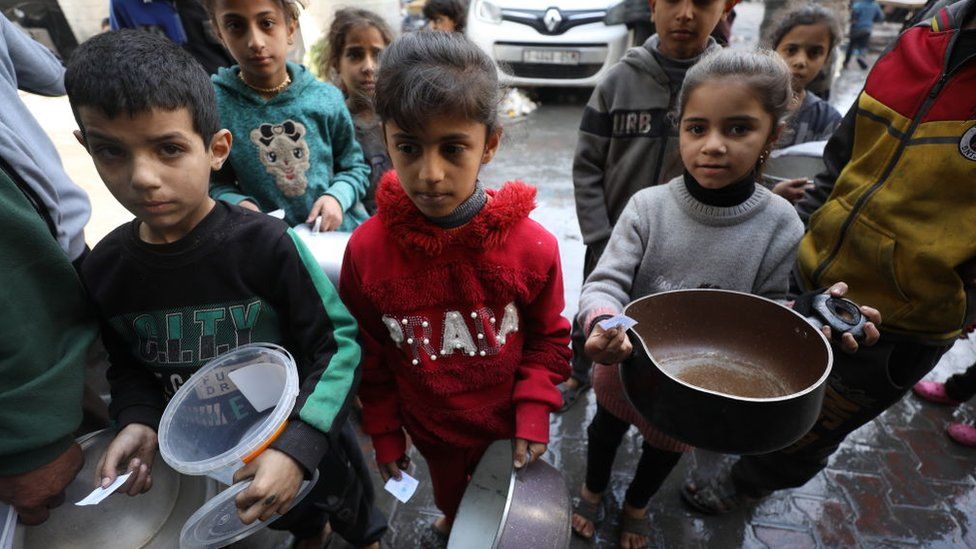Top UN court orders Israel to allow food and medical aid into Gaza
- Published

The UN's top court has ordered Israel to enable the unhindered flow of aid into Gaza in order to avert a famine.
In a unanimous decision, the International Court of Justice (ICJ) said Israel had to act "without delay" to allow the "provision... of urgently needed basic services and humanitarian assistance".
This follows warnings that famine could hit Gaza within weeks.
Israel has called allegations it is blocking aid "wholly unfounded".
Giving its response to the court order, the Israeli foreign ministry said it was continuing "to promote new initiatives, and to expand existing ones" to allow a continuous flow of aid into Gaza "by land, air and sea", working with the UN and others.
It said that Hamas was to blame for the situation in Gaza and for starting the war.
The latest ruling by the court in The Hague comes after South Africa asked it to bolster an order issued to Israel in January to take all measures to prevent genocidal acts in Gaza.
South Africa said it had an obligation to act to prevent genocide as a signatory of the UN's 1948 Genocide Convention.
The country has been highly critical of Israel's military operation in Gaza and its governing African National Congress (ANC) has a long history of solidarity with the Palestinian cause.
Although orders issued by the ICJ are legally binding, the court lacks the power to enforce them. The UN Security Council is the only UN body which can introduce measures to try to ensure compliance.
The ICJ's ruling comes after a report by the Integrated Food Security Phase Classification Global Initiative, which is run by the World Food Programme and others, was published last week - warning that a "catastrophic" situation was developing in Gaza.
It said that all of the 2.2 million people in Gaza were "facing high levels of acute food insecurity" and that famine was projected to hit the north of the territory before the end of May.
Famine occurs when a country has such a severe food shortage that its population faces acute undernourishment, starvation, or death.
In its ruling, the ICJ said Gaza was "no longer facing only a risk of famine" but "famine is setting in" and that, according to UN observers, 31 people, including 27 children, had already died of malnutrition and dehydration.
The court also noted comments by Volker Türk, the UN's high commissioner for human rights, who said last week that the "situation of hunger, starvation and famine" was "a result of Israel's extensive restrictions on the entry and distribution of humanitarian aid and commercial goods, displacement of most of the population, as well as the destruction of crucial civilian infrastructure".
Mr Türk recently told the BBC that there was a "plausible" case that Israel was using starvation as a weapon of war in Gaza and that, if intent was proven, this would amount to a war crime.
The ICJ said Israel had to "take all necessary and effective measures to ensure, without delay, in full co-operation with the United Nations, the unhindered provision at scale... of urgently needed basic services and humanitarian assistance".
The aid most needed included food, water, electricity, fuel, shelter and clothing as well as hygiene products and medical supplies, it said.
In recent months long queues of aid trucks have repeatedly formed as they wait to enter Gaza from Egypt, and accusations have been levelled at Israel that it is subjecting the deliveries to complex and arbitrary checks.
Israel has also said that Hamas takes much of the aid that enters Gaza and accused the UN of failing to distribute what is left to the civilian population.
The current conflict began after the 7 October attack, which saw Hamas-led gunmen storm across the border into Israel, killing around 1,200 people and taking more than 250 others hostage.
Of those taken, about 130 remain unaccounted for, at least 34 of whom are presumed dead.
Gaza's Hamas-run health ministry says Israel's retaliatory campaign has killed at least 32,623 people. Earlier this month, US Defence Secretary Lloyd Austin said that, of those killed, more than 25,000 were women and children.
Israel has vowed to press on with its mission to eliminate Hamas, despite the UN Security Council passing a resolution calling for an immediate ceasefire earlier this week.
Israel's military recently launched another raid on al-Shifa hospital - Gaza's biggest - where thousands of displaced people are sheltering.
Al-Amal hospital in southern Gaza was taken out of service earlier this week after Israeli troops forced medics and patients to evacuate, the Palestine Red Crescent Society reported.
There have also been repeated Israeli air strikes on what it says are Hamas targets throughout Gaza.
Israel has threatened to launch an offensive in the southern city of Rafah, where more than 1.5 million Palestinians are sheltering.
- Published30 January
- Published12 April